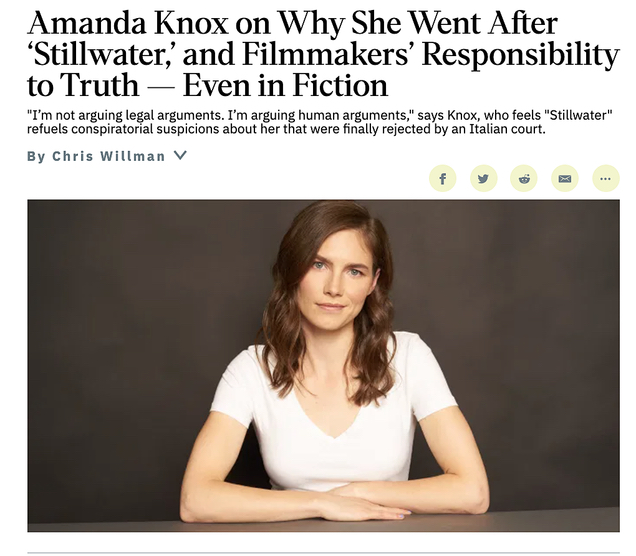Herewith an official capsule synopsis for James Gray’s Armageddon Time, which has been waiting for Robert DeNiro’s availability and will finally start shooting in October or thereabouts: [Thanks to Jordan Ruimy for image capture.]
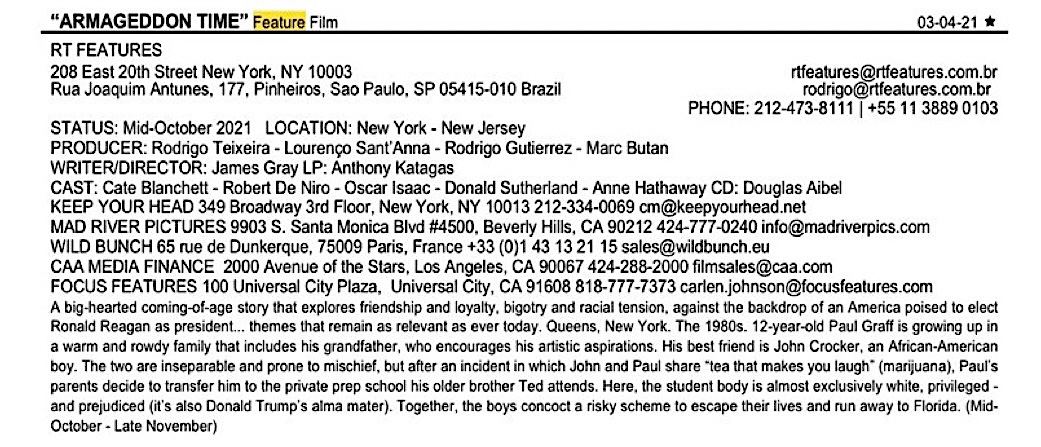
Herewith an official capsule synopsis for James Gray’s Armageddon Time, which has been waiting for Robert DeNiro’s availability and will finally start shooting in October or thereabouts: [Thanks to Jordan Ruimy for image capture.]

More than any other admonishment or influence, this horrific photo (snapped 11 years ago by Sasha Stone) made me stand up straighter and think more seriously about good vs. bad posture. One glance and I was immediately flashing back to Charles Bukowski’s book about working as a bent-over mail carrier.
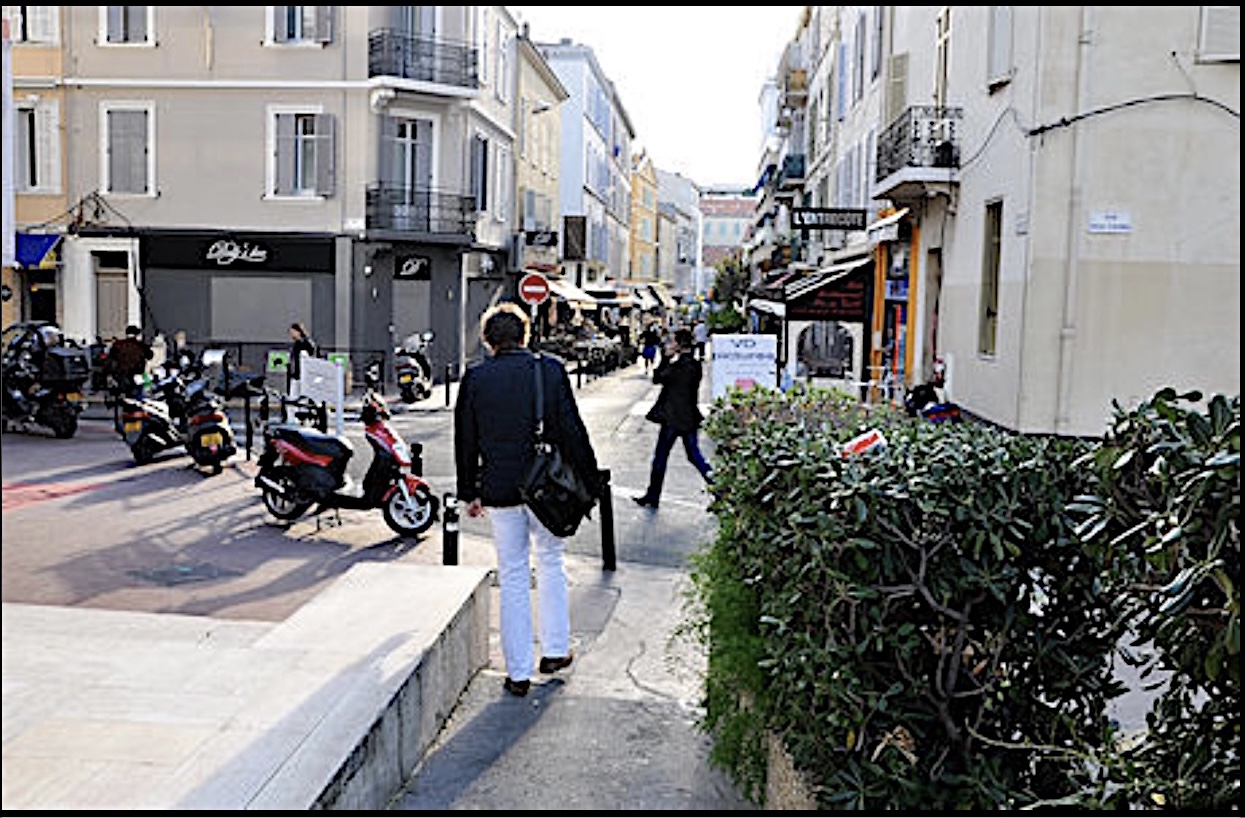
From 8.7 HE comment thread (“Best Real Time Debate in Months”):
In a reaction piece, Daily Beast‘s Marlow Stern has claimed that the notion that CRT is being taught to kids is “false” and that “you can really only find it in law schools.”
Correction: Anastasia Higginbotham’s “Not My Idea” is being taught in schools. And hers is not the only such book.

I was 19 when I inhaled the first joint of my life, and after five or six tokes (I was sharing with three or four others) I was completely ripped. I had no choice but to succumb to all the classic effects — giggling fits (I don’t think I’ve ever laughed quite as hard or as hysterically), dry-mouth, time drop-outs (falling into a deep dream state as through a trap door and then abruptly returning to reality, not knowing if 30 seconds or 45 minutes had passed) and of course the munchies.
Barbra Streisand apparently never experienced any of this, which indicates caution in her bones. Caution and hesitancy. God had simply ordained that she wouldn’t be open to easing up or letting go…floating downstream into that sparkling cosmic Revolver dream state…”it is being”, John Lennon, newspaper taxis…the realm that kept on giving…her Brooklyn-honed mentality said “nope” and that was that…never again.

Ben Shapiro vs. Malcolm Nance on Critical Race Theory, and I was riveted. Delighted actually. It lasted nine and a half minutes, and I wished it could have gone on for 20. This is the kind of crossed-swords dispute that Bill Maher‘s show needs more of. Shapiro “won”, by the way — it was the first time I’d watched him debate while saying to myself, “This is reasonable, he’s making sense,” etc. Shapiro’s CRT definition struck me as spot-on, and Nance (who was a little unfair and dismissive with that statement about his great-grandfather) agreed with it.
Now that Leos Carax‘s Annette is playing in theatres, I’m a bit put off by the positive reviews. More than 60% of the critics on both Rotten Tomatoes and Metacritic are giving it a pass, and that’s not cool. But I’m mainly perplexed by the the genteel tone of the pans. Nobody hates this film, in short, and that doesn’t feel right. Because if there’s one movie I’ve seen this year that really pushed the revulsion button, it’s Annette.
You can admire or love Annette, of course, but if you don’t approve mild naysaying is not the way to go — trust me.
In his New Yorker review, Anthony Lane delivers what feels to me like a kid-gloves pan. He says that Annette “is a folie de grandeur, alas, without the grandeur,” and that it “strikes one false note after another,” and that “there’s nothing in Annette” — a sung-through musical, for the most part — “that’s quite as overwhelming as Adam Driver’s roaring rendition of Stephen Sondheim’s ‘Being Alive’ in Marriage Story,” etc. See? He wont do the mean.
CNN’s Brian Lowry: “Let the record show that no drinking took place while watching the movie for this review. But by the time it was over, that didn’t seem like a bad idea.” Not bad, still too restrained.
Time‘s Stephanie Zacharek: “Driver’s height and brawn are used to menacing effect here. He’s never been so believably unlikable, which is certainly an achievement, if it’s the kind of thing you want to see.” Better!
For me, reviewing Annette required absolute fuck-all bluntness. I titled the review”Revulsion and Contempt.”
“Only the most perverse, anti-populist critics will even flirt with being kind to, much less praising, Annette when it opens stateside,” I wrote. “Once you get past the strikingly surreal visual style and the fact that it was, like, made at all, there is only the self-loathing rage of Adam Driver’s Henry McHenry character, and Carax’s seething disdain for easily led-along audiences.
“Annette is ‘brave’ and wildly out there, but this is arguably the most morally repellent musical ever made in motion picture history. Driver’s Henry, an envelope-pushing comedian who performs one-man shows that aren’t in the least bit amusing, is astounding — one of the most flagrantly revolting protagonists I’ve ever spent time with in my moviegoing life.
“Henry is a kind of sociopathic Jack the Ripper figure, and Annette is a misanthropic rock opera about rabid egotism, demonic personality disorder, black soul syndrome, rage, alcoholism, murder, self-loathing, self-destruction.”
In an 8.4 Variety interview Amanda Knox told Chris Willman that she hadn’t yet seen Tom McCarthy‘s Stillwater. (She added she wouldn’t mind being invited to a screening while hinting that paying to see it might be a bridge too far.) I wrote yesterday that this didn’t make a lot of sense, and that Knox should’ve paid to see it at a local plex as soon as she was able to, in order to lend authority to her argument that the film had unfairly appropriated her legal troubles in Italy from over a decade ago.
And now, in a just-posted interview with Variety‘s Janelle Riley, McCarthy has pounced on Knox’s admission that she hasn’t seen the film.
Riley: “I’m sure you’re aware Amanda Knox has taken issue with the film, saying it’s based too closely to her own story. What’s your response?”
McCarthy: “I deeply empathize with Amanda and what she went through. She was rightfully found innocent and acquitted in the Meredith Kercher case. She has platforms to speak her truth and engage with the media and she is exercising her absolute right to do so. But, by her own account, she has not seen Stillwater and what she seems to be raising feels very removed from the film we actually made.
“Stillwater is a work of fiction and not about her life experience. It does take from aspects of true life events, like many films, but Stillwater is about Bill Baker’s journey, his relationship with his estranged daughter Allison and a French woman and her young daughter he meets along the way. The questions the movie poses about American identity and moral authority are what compelled me to make this film. But I do think good films spark conversation in and around the story, and I welcome audiences’ engagement in that.”
In short, McCarthy is better at this game than Knox.
An excellent job of selling a half-century-old film — the forthcoming, undoubtedly spiffy 4K Bluray of Stanley Kubrick‘s A Clockwork Orange (9.21.21).
From yesterday’s [8.5] pay-walled assessment: “It’s still a crisp, clean, mesmerizing film, and I’ll never stop worshipping that final shot of those well-dressed 19th Century couples clapping approval as Alex and a scampy blond cavort in the snow. But this is nonetheless one really cold film. And yet at the same time (and this is what makes Orange such an odd duck) it’s genuinely amusing here and there. Every line and gesture delivered by Michael Bates‘ chief prison guard is a hoot, and I chuckle every time I see that fat, middle-aged fuckface making kissy-face gestures at Malcolm McDowell‘s Alex in the prison chapel.
“At the same time I can’t honestly say that I like A Clockwork Orange much any more. I was always more impressed with the scene-by-scene verve than what it all amounted to in the end. I still respect the visual energy and exquisite 1.66:1 framings (John Alcott was the dp) and the Wendy Carlos meets Gene Kelly meets lovely lovely Ludwig Van musical score, and I still “admire” the tone of ironic ruthlessness and even fiendishness, but I’m not even sure if I like McDowell’s performance any more. (I feel a much greater rapport these days with his Mick Travis character in Lindsay Anderson‘s If…) I respect Orange historically, of course, and I still love the stand-out moments from the flawless first act, but it hasn’t delighted me overall for years.
“A Clockwork Orange was the first Kubrick film that felt wholly misanthropic** — a high-style show-off movie that sold audiences on the idea that Kubrick-stamped cruelty and brutality were palatable — that irony and arch acting styles somehow changed the game. But it was always more amoral than moral, and pretty much devoid of human compassion. Orange has 23 significant characters with noteworthy dialogue, and only one could be honestly described as decent or humane — Godfrey Quiqley‘s prison chaplain.”
Stanley Kubrick‘s A Clockwork Orange will celebrate its 50th birthday on 12.19.21. I don’t know if I’ll be able to summon fresh interest as I’ve seen this cynical, ice-cold film too many times, but the new 4K Ultra HD Bluray from Warner Home Video — a fresh harvest, sure to look better than the current Bluray version — is too appetizing to refuse. I bought it today on Amazon. The street date is 9.21.21.
Orange remains a chilly, dead-on capturing of Anthony Burgess’s 1962 novel, and it seems doubly fascinating when you regard it as a portrait of the chilly, German-like social scientist that Pauline Kael imagined that Kubrick had become in ’71, and indeed the fellow that Kubrick had more or less evolved into since he made Dr. Strangelove seven or eight years earlier.
It’s still a crisp, clean, mesmerizing film, and I’ll never stop worshipping that final shot of those well-dressed 19th Century couples clapping approval as Alex and a scampy blond cavort in the snow. But man, it’s really cold and almost induces nausea from time to time. And yet at the same time it’s genuinely amusing here and there. Every line and gesture delivered by Michael Bates‘ chief prison guard is a hoot, and I chuckle every time I see that fat, middle-aged fuckface making kissy-face gestures at Malcolm McDowell‘s Alex in the prison chapel.
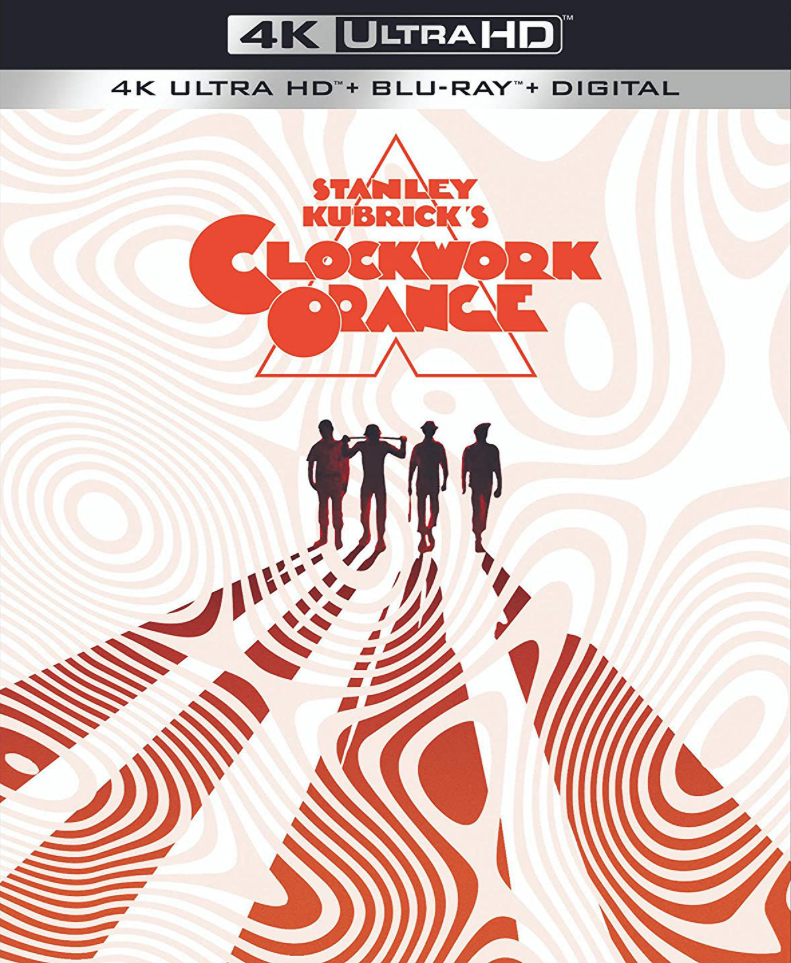
At the same time I can’t honestly say that I like A Clockwork Orange much any more. I was always more impressed with the scene-by-scene verve than what it all amounted to in the end. I still respect the visual energy and exquisite framings (John Alcott was the dp) and the Wendy Carlos meets Gene Kelly meets lovely lovely Ludwig Van musical score, and I still admire the ironic ruthlessness and even fiendishness, but I’m not even sure if I like McDowell’s performance any more. (I feel a much greater rapport these days with his Mick Travis character in Lindsay Anderson‘s If…) I respect Orange historically, of course, and I still love the stand-out moments from the flawless first act, but it hasn’t delighted me overall for years.
A Clockwork Orange was the first Kubrick film that felt truly misanthropic — a high-style show-off movie that sold audiences on the idea that Kubrick-stamped cruelty and brutality were palatable — that irony and arch acting styles somehow changed the game. But it was always more amoral than moral, and pretty much devoid of human compassion. Orange has 23 significant or otherwise noteworthy characters, and only one could be honestly described as decent or humane — Godfrey Quiqley‘s prison chaplain.
A Dickensian crime-and-punishment thing, Orange is composed of four acts or movements. The first act is about the wicked rush of sociopathic “fun”, but the second and third acts (applying the Luduvico technique + Alex suffering for his crimes after being released from prison) comprise a long and punishing slog. The film rebounds during its brief fourth act (the hospitalized Alex cuts a deal with Anthony Sharp‘s Minister of the Interior, and is restored to his old wicked self) and the ending shot, a sexual fantasy sequence, is the equal of Kubrick’s “We’ll Meet Again” finale in Dr. Strangelove.
In years past the Gotham Awards have (a) never handed out male/female acting awards in the supporting category, and (b) only focused on Best Actor and Best Actress. The new thing, announced today, is that henceforth the Gotham acting awards will be (a) gender neutral and (b) will focus on lead and supporting — i.e., one in each category.
So hooray for supporting actors but boo-hoo at the same time because only one actor of either gender can win a Gotham supporting actor trophy. Likewise, only one lead actor (either gender) can win.
The new acting categories will be called Outstanding Lead Performance and Outstanding Supporting Performance.
May I suggest something? If the Gothams must do the gender-neutral thing, hand out four of them — two lead, two supporting.
Friendo: “While wokesters believe in disappearing gender, they also believe in non-color-blind casting and race relations. These two things do not agree with each other. Plus gender neutral ignores how women have a hard time getting great roles, especially women of color. Having separate categories HELPS them do better. Taking that away gives men the advantage. It’s so bizarre.”
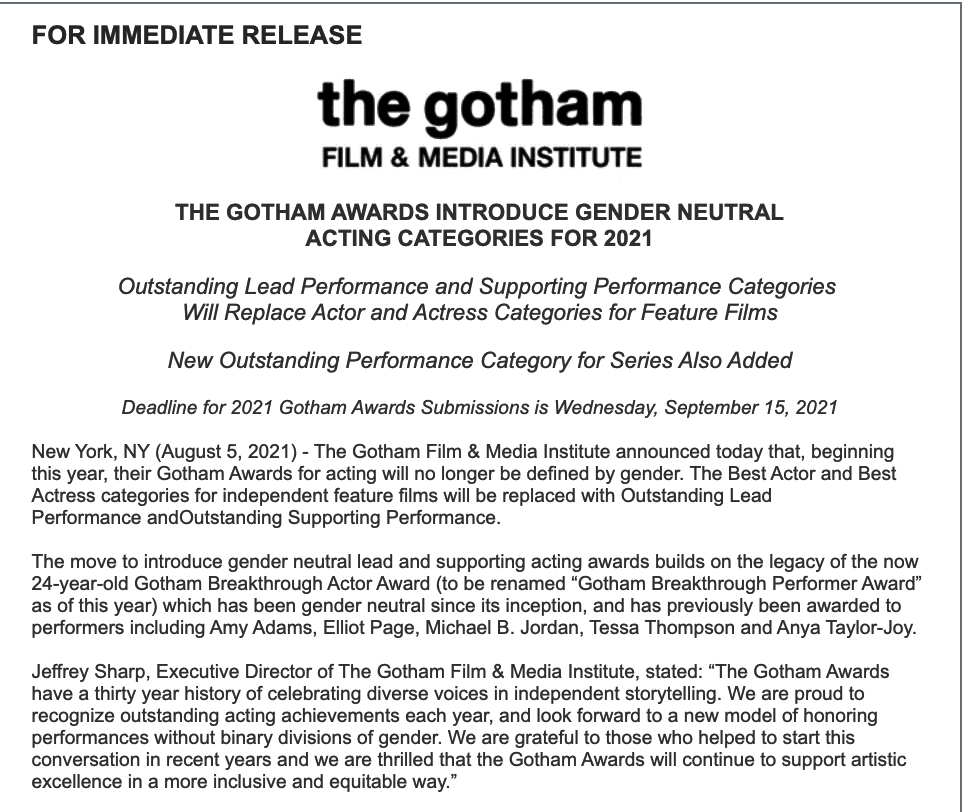
Many of us look forward to films directed by or starring Clint Eastwood because we know (a) they’ll feel as if they were made in 1984 or ’89 or ’96…way back before the superhero era, (b) they’ll basically be meditative and character-driven, and will most likely be peppered with sardonic humor, and (c) they’ll focus on values and decency and Clint’s ornery old cuss being challenged or put through the ringer by a bad guy or two. It’s also a safe bet that an attractive older woman (40s or 50s) will give Clint’s character a wink.
The Cry Macho trailer seems to suggest Gran Torino meets The Mule in Mexico…something like that.
I think Cry Macho (Warner Bros./HBO Max, 9.17) should be bannered as a milestone film. How many legendary, brand-name, Oscar-winning actor-hyphenates have directed and starred in a film at age 91? Has this ever happened in Hollywood history? The Macho script has been around for three-plus decades. Clint almost made it in the late ’80s and then backed away. It has to have something pretty good going on or why did it get made after all this time?
This film appears to have some kind of resonant quality…something that may stick to the ribs…maybe.
Everything Amanda Knox has been saying about Stillwater is sensible and fair.
In admittedly using Knox’s conviction, imprisonment and acquittal on a murder charge in Italy as a jumping off point for an otherwise fictional story, director and co-writer Tom McCarthy has somewhat callously dredged up a lot of bad business and has re-implanted the idea that there’s something possibly sketchy and wanton about Knox herself. And Knox resents this. Who wouldn’t in her position? I can’t imagine anyone telling Knox that her complaints are unwarranted.
It’s odd, however, that in an 8.4 interview with Variety‘s Chris Willman Knox states that (a) she hasn’t seen Stillwater yet (it opened last Thursday night) and yet (b) she would “absolutely go see it, especially if they invited me…that would be nice.”
Knox tells Willman she’s been informed how the story unfolds (“I did some invest-imigating”), but if you were Knox and giving interviews to everyone about a completely valid complaint about a just-opened film, wouldn’t you take the time to pop into a megaplex and see the damn thing already? Doesn’t that make basic sense?
For one thing it’s conceivable that Abigail Breslin‘s performance as the vaguely-Knox-resembling Allison Baker might radiate certain emotional currents that Knox might be receptive to and which might influence her general thinking…no? Experiencing a film is essential.
Where exactly was the upside in Knox not slipping into a showing last weekend? I really don’t get this part.
In mentioning the hypothetical idea of Focus Features inviting her to see the film, Knox seems to imply that this is her due. (“Since we’re stirring your life up and sending you back into a decade-old nightmare, it’s the least we can do.”) She also seems to be suggesting that personally paying to see the film would be adding insult to injury.
I wouldn’t futz around with this stuff if I were Knox. I would have bought a ticket to one of the very first commercial showings last Thursday night — no ifs, ands or buts. If you have a beef with a movie, you have to watch it.
